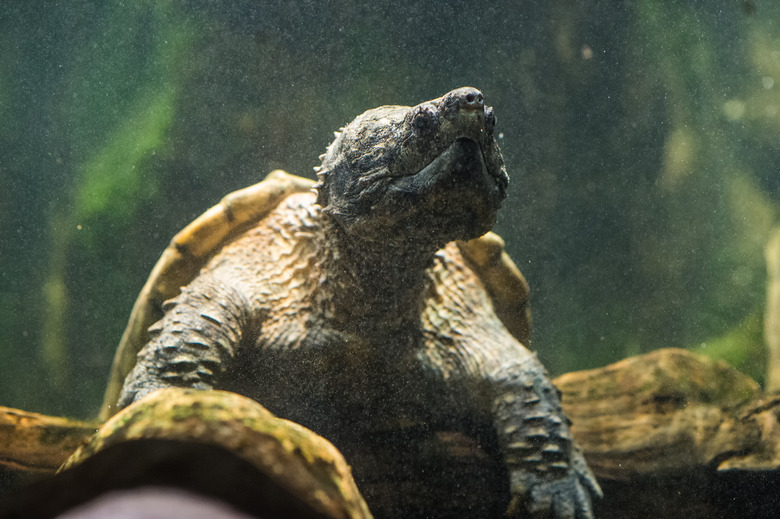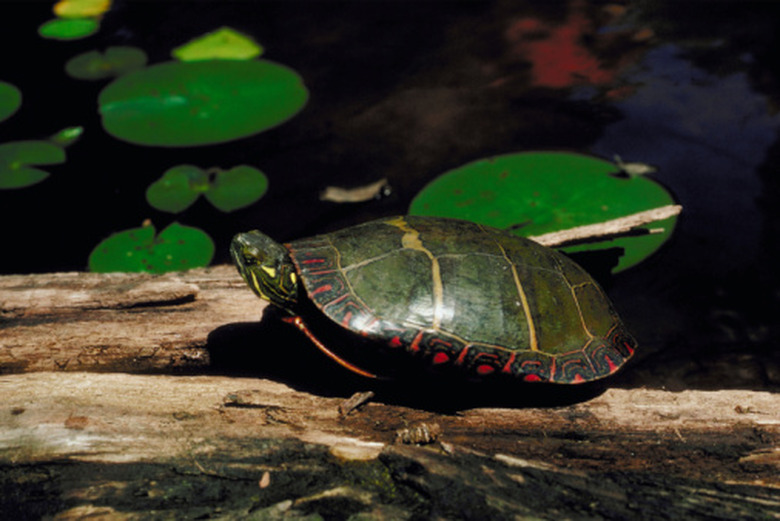What Is The Difference Between A Snapping Turtle & A Painted Turtle?
When you have a pet turtle, you have to know the species to give it proper care. A gentle painted turtle is among the most agreeable pets. A fussy snapping turtle, which does tend to snap at things, is not. The snapping turtle also grows much larger than a painted turtle. However, when they are babies and small, the differences are not that extreme.
Differences in Appearance
Differences in Appearance
The common snapping turtle is black, brown or tan. It has a large head and a long tail. The painted turtle is black to olive green. It has colored markings on the shell that can be yellow or orange or a mix of both. These markings are also present on the underside. The head and legs of the painted turtle have bright yellow markings.
Shape and Size
Shape and Size
The common snapping turtle has a tapered shape. It is thick near the front where it has a mass of muscles supporting its front legs and powerful neck. The painted turtle has a consistent thickness and oval shape. The snapping turtle can reach up to 13 inches in length and can weigh up to 35 lbs. An adult painted turtle will top out at between 3 and 7 inches long. The males may weigh as much as 10 oz. while females could weigh up to 18 oz.
Life Span
Life Span
Painted turtles mature at six to eight years while the snapping turtle takes 11 to 16 years to mature. Differences in maturity and life span affect the turtles' ability to withstand environmental challenges and human harvesting. Turtles that mature quickly can reproduce over a shorter time span, thus replacing the population's losses.
Behavioral Differences
Behavioral Differences
Painted turtles are relatively mild mannered, especially when compared to snapping turtles. A startled painted turtle may try to bite, but its primary defense is to pull itself into its shell. The snapper, however, can be cantankerous and irritable. It is not likely to pull into its shell if disturbed, preferring an aggressive defense. The snapping turtle bite is powerful! If you are trying to pick up the snapping turtle, the Missouri Conservation Department recommends you grab the shell near the tail to avoid being bitten.
Dietary Preferences
Dietary Preferences
According to the Missouri Conservation Department, a snapping turtle in the wild prefers insects, crayfish, fish, earthworms, amphibians, small mammals and birds. A third of its diet is aquatic vegetation. A painted turtle will also eat vegetation and meat. In captivity it needs a mix of fruits and vegetables like leafy greens, bananas and apples, with minnows, snails, guppies and small portions of cooked chicken and beef.
Cite This Article
MLA
Scott, Daniel. "What Is The Difference Between A Snapping Turtle & A Painted Turtle?" sciencing.com, https://www.sciencing.com/difference-snapping-turtle-painted-turtle-8603896/. 22 November 2019.
APA
Scott, Daniel. (2019, November 22). What Is The Difference Between A Snapping Turtle & A Painted Turtle?. sciencing.com. Retrieved from https://www.sciencing.com/difference-snapping-turtle-painted-turtle-8603896/
Chicago
Scott, Daniel. What Is The Difference Between A Snapping Turtle & A Painted Turtle? last modified March 24, 2022. https://www.sciencing.com/difference-snapping-turtle-painted-turtle-8603896/

